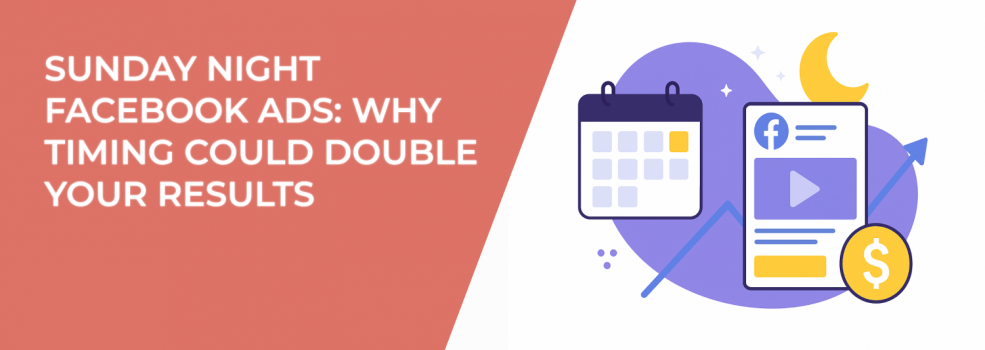Most advertisers obsess over creative and targeting. They spend hours debating whether a carousel will outperform a video, or if a lookalike audience is more cost-effective than interest-based targeting. But one factor that rarely gets the attention it deserves is timing. The moment your ad reaches your audience can completely change the outcome.
Sunday night is a time slot many marketers overlook. Yet, for the right campaigns, it can deliver surprisingly strong results — sometimes even doubling engagement or cutting ad costs significantly. Let’s break down why Sunday evening is different, how advertisers can take advantage of it, and what pitfalls to avoid.
Why Sunday Night Is Different
Sunday evenings have their own digital rhythm. People are winding down after the weekend, easing into Monday mentally, and often glued to their phones. That’s when scrolling habits spike.
The psychology is simple: weekends are for activity, Monday is for obligations, but Sunday evenings are for transition. Users are more likely to:
-
Reflect on what they didn’t get done during the week.
-
Start planning purchases or tasks for the upcoming week.
-
Look for inspiration or motivation before Monday hits.
Instead of being distracted or rushed, people are receptive. They have time. They’re relaxed, yet future-focused. For advertisers, this means a window where ad messages not only reach people but also stick.
It’s also worth noting that ad competition is often lighter at this time. Many businesses schedule campaigns to run heavily on weekdays when they assume people are “in buying mode.” That leaves Sunday night less crowded, which can result in lower CPMs and CPCs.
If you’ve ever felt your ads get buried midweek, you may find Sunday evening a refreshing change. For broader strategies on how Meta’s targeting has evolved, you might want to check out Facebook Ads Targeting Updates: How To Adapt in 2025.
The Case for Testing Sunday Night Ads
Marketers are naturally skeptical of “magic” time slots. But testing Sunday nights is less about chasing hype and more about aligning with natural human behavior.
Think of it this way: the timing works with your audience’s mood rather than against it. By Sunday evening, many people are:
-
Shopping online for items they postponed buying during the week.
-
Catching up on social media activity they missed.
-
Searching for tools, apps, or services that make their week easier.
When you place your Facebook ads in that window, you’re showing up at the exact moment people are open to solutions. This doesn’t guarantee conversions, but it stacks the odds in your favor.
Let’s say you’re running ads for a meal-prep delivery service. Launching those ads on Sunday night ties directly into what users are thinking about: “What am I eating this week?”
Or imagine you’re promoting an online course. A Sunday evening ad taps into the “new week, new me” mentality that’s especially strong during that time. Want more inspiration? Read how other businesses are finding clients on Facebook using timing and targeting to their advantage.
How to Optimize Facebook Ads for Sunday Nights
Running ads on Sunday evenings is only step one. To truly maximize results, you need to tailor your campaign settings, creative, and monitoring strategy. Here’s how you can do it.
First, adjust your scheduling. Facebook Ads Manager allows you to choose specific delivery times. Don’t waste budget on Sunday mornings when people are busy with errands or out of the house. Narrow your delivery to the 6 PM to 11 PM window, when scrolling is at its peak.
Second, write copy for the Sunday mindset. Audiences are preparing for the week ahead, so tap into that energy. Instead of a generic headline like “Save Time with Our App,” try something with context: “Make Monday mornings easier with [product/service].” Small shifts in tone make your ad feel more relevant and timely.
Third, watch your frequency levels closely. Because you’re condensing delivery into a short timeframe, there’s a higher risk of showing the same ad too many times to the same people. Use frequency caps or rotate creative variations to keep things fresh. For more ideas, explore how frequency capping helps beat Facebook ad fatigue.
Finally, compare results across days. Don’t assume Sunday is automatically best. Run split tests against other evenings like Wednesday or Friday. You may discover that Sunday night is your sweet spot, or you may find another time slot that delivers equally well at an even lower cost.
By carefully planning these details, you avoid wasting spend and give yourself the clearest picture of whether Sunday evenings are worth scaling.
Common Mistakes to Avoid
Like any strategy, Sunday-night advertising can backfire if done poorly. Before diving in, keep these pitfalls in mind.
Many advertisers forget to narrow the window. Running “Sunday ads” all day dilutes the effect. Remember, it’s the evening hours that carry the strongest impact.
Others recycle generic creative. Ads that worked on a Thursday afternoon may not resonate on a Sunday night. The mood is different — your creative should reflect that.
And finally, some marketers ignore mobile-first design. Most Sunday evening browsing happens on phones. If your ad images are cropped awkwardly or your landing page takes more than a few seconds to load, you’ll lose conversions no matter how good your timing is.
For a deeper dive into diagnosing and troubleshooting ad delivery, read Understanding Facebook Ad Statuses: Common Issues and How to Fix Them.
A Simple Experiment Worth Trying
The easiest way to find out if Sunday evening works for your brand is to test it. Take a small portion of your budget — maybe 10% — and dedicate it exclusively to that time slot. Run it for at least two to three weeks so you can see trends rather than one-off spikes.
As you test, track core metrics like:
-
Cost per click (CPC) — Are clicks cheaper on Sunday night than during the week?
-
Click-through rate (CTR) — Do people engage more with your ads in this slot?
-
Conversion rate — Do those clicks turn into meaningful actions?
Don’t stop there. Ask deeper questions: Are the people clicking your Sunday ads sticking around longer on your site? Are they more likely to complete purchases or sign up for trials? Numbers matter, but the quality of engagement matters even more.
If your goal is lead generation, you can combine this timing strategy with proven funnel approaches. Take a look at Mastering Lead Generation in 2025: Top Tactics for Success to get ideas you can layer into your campaigns.
Final Thoughts
Sunday night Facebook ads aren’t a gimmick. They’re an underutilized opportunity rooted in audience behavior and psychology. People are relaxed, reflective, and preparing for the week ahead — and that’s exactly when they’re most open to seeing and responding to ads.
The best advertisers don’t just target the right people with the right message; they also think critically about when those messages appear. By experimenting with Sunday night campaigns, you might uncover one of the simplest and most cost-effective ways to stretch your ad spend.
So, the next time Sunday evening rolls around and your audience is winding down with their phones in hand, will your ads be there waiting?

